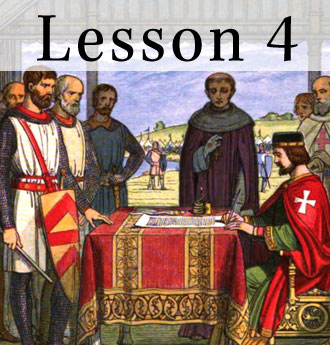Lesson 4: What Were the British Origins of American Constitutionalism?
A resolution of House of Commons, 1669
A resolution of the House of Commons in 1669 guaranteeing the right to petition the lower house of Parliament.
Link: http://tinyurl.com/6ojyjt
Act of Supremacy 1533
From Wikipedia: The first Act of Supremacy granted King Henry VIII of England Royal Supremacy which is still the legal authority of the Sovereign of the United Kingdom. Royal Supremacy is specifically used to describe the legal sovereignty of the civil laws over religious ones, which validated Henry VIII's marriage to Anne Boleyn.
Link: http://www.tudorhistory.org/primary/supremacy.html
Blackstone Commentaries on the Laws of England
From Wikipedia: The Commentaries on the Laws of England are an influential 18th century treatise on the common law of England by Sir William Blackstone, originally published by the Clarendon Press at Oxford, 1765-1769.
Link: http://tinyurl.com/yhf39sr
De Libellis Famosis (1606)
From Wikipedia: The crime of seditious libel was defined and established in England during the 1606 case De Libellis Famosis by the Star Chamber. The case defined seditious libel as criticism of public persons, the government, or King.
Link: http://tinyurl.com/yj3b6hb
Declaration of Independence 1776
From Wikipedia: The United States Declaration of Independence is a statement adopted by the Continental Congress on July 4, 1776, which announced that the thirteen American Colonies then at war with Great Britain were now independent states, and thus no longer a part of the British Empire.
Link: http://www.ushistory.org/declaration/document/index.htm
Edmund Burke's Speech to the Electors at Bristol, 1774
Edmund Burke's acceptance speech after being elected to represent Bristol, in which he defends the principles of representative democracy.
Link: http://tinyurl.com/yza6o4v
English Bill of Rights 1689
Act passed by the British Parliament in 1689 enumerating rights of British subjects and residents.
Link: http://avalon.law.yale.edu/17th_century/england.asp
English Translation of Magna Carta
English translation of Magna Carta
Link: http://www.constitution.org/eng/magnacar.htm
Habeas Corpus Act 1679
The Habeas Corpus Act 1679 is an act of the English Parliament defining and strengthening habeas corpus, by which a detainee who has appealed to the judiciary must either be set free or have a charge brought against him.
Link: http://www.bl.uk/learning/timeline/item104236.html
Montesquieu--The Spirit of Laws, 1748
In this political treatise Montesquieu advocates the idea that political and legal institutions ought to reflect the social and geographical character of each particular community, that governments need not be permanent.
Link: https://goo.gl/N4Lrkj
Petition for a Charter of New England, March 3, 1619
A petition by the Northern Company of Adventurers to create a new settlement and local government in the area they designate as New England.
Link: http://avalon.law.yale.edu/17th_century/charter_002.asp
Petition of Right
From Wikipedia: The Petition of Right is a major English constitutional document, which sets out specific liberties of the subject that the king is prohibited from infringing.
Link: http://www.britannia.com/history/docs/petition.html
The Habeas Corpus Act of 1641
From Wikipedia: Ac Act of the Parliament of England that was passed by the Long Parliament shortly after the impeachment and execution of Thomas Wentworth, 1st Earl of Strafford in 1641 and before the English Civil War. The writ was amended by the Habeas Corpus Act 1679.
Link:






